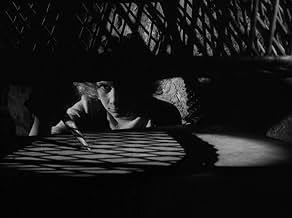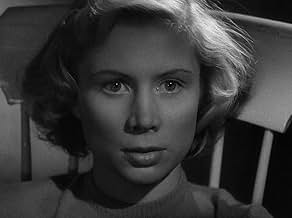IMDb-BEWERTUNG
6,7/10
2274
IHRE BEWERTUNG
Füge eine Handlung in deiner Sprache hinzuA film director tries to create the best film in history, but finds out that human abilities have their limits.A film director tries to create the best film in history, but finds out that human abilities have their limits.A film director tries to create the best film in history, but finds out that human abilities have their limits.
Birgit Lindkvist
- Anna - inneboende på pensionatet
- (as Bibi Lindkvist)
Britta Holmberg
- Birgitta's Mother in Dream
- (Synchronisation)
John W. Björling
- En man i Birgitta Carolinas dröm
- (Nicht genannt)
Sven Björling
- En filmarbetare i ateljén
- (Nicht genannt)
Anita Blom
- Anna - Signes kusindotter
- (Nicht genannt)
Britta Brunius
- Lasses mamma
- (Nicht genannt)
Åke Engfeldt
- Ena kriminalpolisen
- (Nicht genannt)
Gösta Ericsson
- Andra kriminalpolisen
- (Nicht genannt)
Kenne Fant
- Arne - Skådespelare
- (Nicht genannt)
Empfohlene Bewertungen
I am a big Begman fan, and in recent times I've gone back to some of the early films - initially just because I thought it might be interesting to see the "juvenilia", but gradually I realised that so many of them are wonderful. I've now seen Prison 4 times, and each time I am stunned by how moving and visually powerful it is. And the performance by Doris Svedlund is breath-taking. Is it the most polished film? Who cares!
Bergman did many dream sequences in films (e.g. Wild Strawberries, Face to Face) - really hard to make them un-cringey - but the one in Prison is about as good as it gets.
So wonderful artistically, and very moving in terms of human interest. There is an orthodoxy about peoples "great" films which often gets in the way of just seeing what is there - please do watch great Bergman film .. I hope you won't be disappointed!
Bergman did many dream sequences in films (e.g. Wild Strawberries, Face to Face) - really hard to make them un-cringey - but the one in Prison is about as good as it gets.
So wonderful artistically, and very moving in terms of human interest. There is an orthodoxy about peoples "great" films which often gets in the way of just seeing what is there - please do watch great Bergman film .. I hope you won't be disappointed!
"Prison" (1949) is the first film in which Ingmar Bergman develops something like a style of his own.
We see various elements that reappear in later movies. There is the character of death (to reappear in "The seventh seal", 1957) and dreamsequences (to reappear in "Wild strawberries", 1957).
The most important sign for things to come is however the theme of the film. The film is about a director trying to make a film about a world governed by the devil. Is a world governed by the devil not very much like a wordl where God is silent? Later Bergman would make a trilogy around this theme consisting of the films "Through a glass darkly" (1961), "Winterlight" (1963) and "The silence" (1963).
So in "Prison" Bergman started to experiment with a personal style, but this style was not fully developed yet. There are good sequences (such as the dream sequence) but as a whole the film is somewhat cluttered and inaccessible. Moreover the film in a film format about a director struggling to make a film does not work very well in "Prison". It does work very well in "8,5" (1963, Federico Fellini), but the Bergman of 1949 is not the Fellini of 1963.
We see various elements that reappear in later movies. There is the character of death (to reappear in "The seventh seal", 1957) and dreamsequences (to reappear in "Wild strawberries", 1957).
The most important sign for things to come is however the theme of the film. The film is about a director trying to make a film about a world governed by the devil. Is a world governed by the devil not very much like a wordl where God is silent? Later Bergman would make a trilogy around this theme consisting of the films "Through a glass darkly" (1961), "Winterlight" (1963) and "The silence" (1963).
So in "Prison" Bergman started to experiment with a personal style, but this style was not fully developed yet. There are good sequences (such as the dream sequence) but as a whole the film is somewhat cluttered and inaccessible. Moreover the film in a film format about a director struggling to make a film does not work very well in "Prison". It does work very well in "8,5" (1963, Federico Fellini), but the Bergman of 1949 is not the Fellini of 1963.
Bergman's first film where he wrote his own script, and had real artistic control (in exchange for a tiny budget.).
An aging film professor, just released from a mental asylum, visits an old student, now a successful director, and challenges him to make a film showing that the devil really rules the earth. While dismissive in the moment, the director is haunted by the idea, and a journalist friend suggests the film could take off from his experience interviewing a very young prostitute.
We then enter the prostitute's story, and it's (intentionally) never fully clear if what we're seeing is the film that arose from the concept, or the truth of the girl's life.
Beautifully photographed, and full of inventive touches (the main credits are spoken, not seen, over a long tracking shot of a dark cobblestone street), I was also surprised that it contained more of a dark sense of humor, about itself and the world, then most critics acknowledge. In turn, that keeps the film's occasional youthful over-obsession with despair from ever feeling unbearably sophomoric.
I will admit it lost steam for me in the last third, some of the performers aren't quite up to the heavy burdens of the script, and a few sequences are awkward and bespeak Bergman's comparative youth. But the next morning I found myself haunted by images and moments even if the whole only felt partly successful.
An aging film professor, just released from a mental asylum, visits an old student, now a successful director, and challenges him to make a film showing that the devil really rules the earth. While dismissive in the moment, the director is haunted by the idea, and a journalist friend suggests the film could take off from his experience interviewing a very young prostitute.
We then enter the prostitute's story, and it's (intentionally) never fully clear if what we're seeing is the film that arose from the concept, or the truth of the girl's life.
Beautifully photographed, and full of inventive touches (the main credits are spoken, not seen, over a long tracking shot of a dark cobblestone street), I was also surprised that it contained more of a dark sense of humor, about itself and the world, then most critics acknowledge. In turn, that keeps the film's occasional youthful over-obsession with despair from ever feeling unbearably sophomoric.
I will admit it lost steam for me in the last third, some of the performers aren't quite up to the heavy burdens of the script, and a few sequences are awkward and bespeak Bergman's comparative youth. But the next morning I found myself haunted by images and moments even if the whole only felt partly successful.
The real prison is in the minds of these people, and in Bergman's in particular. Bergmann was always obsessed with depression and death; it was in all his fllms. Just like violence is in every Sergio Leone film, some directors are obsessed with one emotion or another. In this one, we find supposedly talented artists are having a difficult time with life. O poor little me! Get over it. People with real talent don't get despondent, they get to work. They may get down once in a while, but they bounce back from adversity, and overcome it. These wusses do not. They expect miracles from their mediocre talents and efforts, and are disappointed when they are not recognized as geniuses or great artists. You know how many years Bogart or Streep had to struggle before they became major stars? A lot longer than these no-talents. I hate agreeing with Woody Allen, but Bergmaaaaan is a joke; a bad joke at that. At least the photography is interesting.
Bergman Collection 20 All Reached
Bergman's first scripted film at the helm, and I didn't expect it to be that good in comparison to his entire career. It's a shame that the CC compilation didn't choose to include this Bergman film, with a hint of that New Wave flavor from Monica the Delinquent. Opened the movie on b-site with the anticipation of the Mask references.
The camera reveal in Godard's Contempt has long been a novelty, and it seems Bergman is still a master of his craft.
Outstanding light shaping, which has become rare in the late Bergman, it is difficult to change the lighting team?
And actually started so early in the discussion of ghosts and gods worthy of Bergman, this step should be counted into the faith trilogy.
BIBI's awful big eyes almost ruined the movie, but I still appreciate her excellent interpretation of the surreal moments that Bergman gave her life. Those big eyes seem to sparkle as if they simply don't know where to use themselves.
The ending wraps up the theme of ghosts and gods, while the core is a human framework, perfect drama. Seal the deal.
Bergman's first scripted film at the helm, and I didn't expect it to be that good in comparison to his entire career. It's a shame that the CC compilation didn't choose to include this Bergman film, with a hint of that New Wave flavor from Monica the Delinquent. Opened the movie on b-site with the anticipation of the Mask references.
The camera reveal in Godard's Contempt has long been a novelty, and it seems Bergman is still a master of his craft.
Outstanding light shaping, which has become rare in the late Bergman, it is difficult to change the lighting team?
And actually started so early in the discussion of ghosts and gods worthy of Bergman, this step should be counted into the faith trilogy.
BIBI's awful big eyes almost ruined the movie, but I still appreciate her excellent interpretation of the surreal moments that Bergman gave her life. Those big eyes seem to sparkle as if they simply don't know where to use themselves.
The ending wraps up the theme of ghosts and gods, while the core is a human framework, perfect drama. Seal the deal.
Wusstest du schon
- WissenswertesIngmar Bergman's first film based on his own original screenplay.
- Crazy CreditsThere are no opening titles in this film. An unseen narrator (Hasse Ekman) reads the credits, as well as the title, out loud approximately ten minutes in to the movie. The sole title card is the standard "Slut" (Swedish for "End") that closes the picture.
- VerbindungenEdited into Geschichte(n) des Kinos: Une histoire seule (1989)
- SoundtracksDrömmen
Composed by Erland von Koch (1949)
Top-Auswahl
Melde dich zum Bewerten an und greife auf die Watchlist für personalisierte Empfehlungen zu.
- How long is Prison?Powered by Alexa
Details
Box Office
- Budget
- 240.000 SEK (geschätzt)
- Laufzeit
- 1 Std. 19 Min.(79 min)
- Farbe
- Sound-Mix
- Seitenverhältnis
- 1.33 : 1
Zu dieser Seite beitragen
Bearbeitung vorschlagen oder fehlenden Inhalt hinzufügen
































